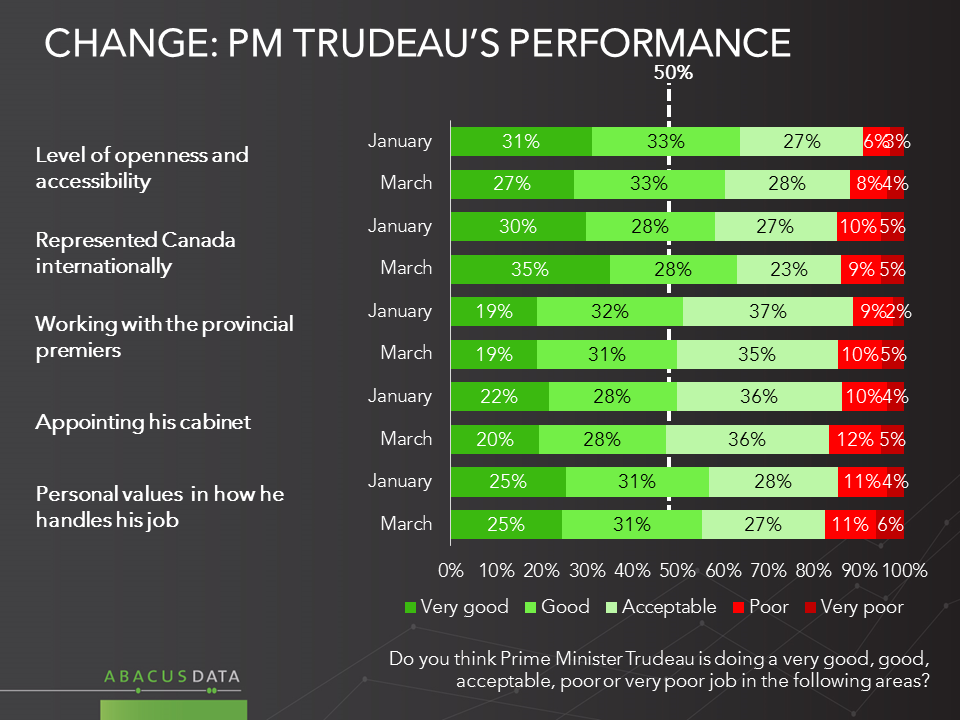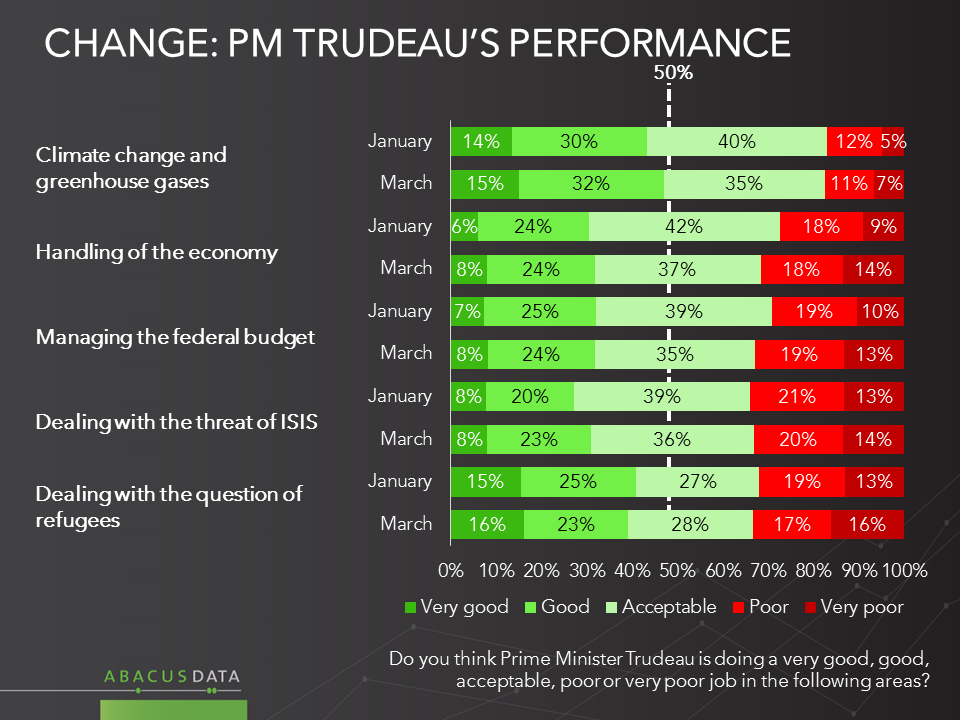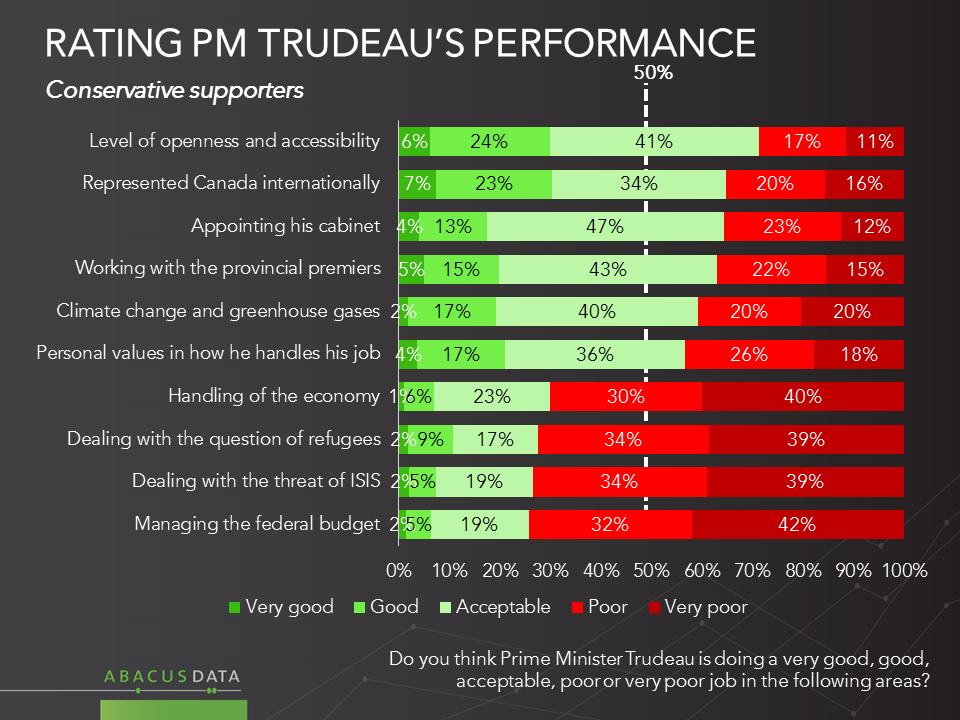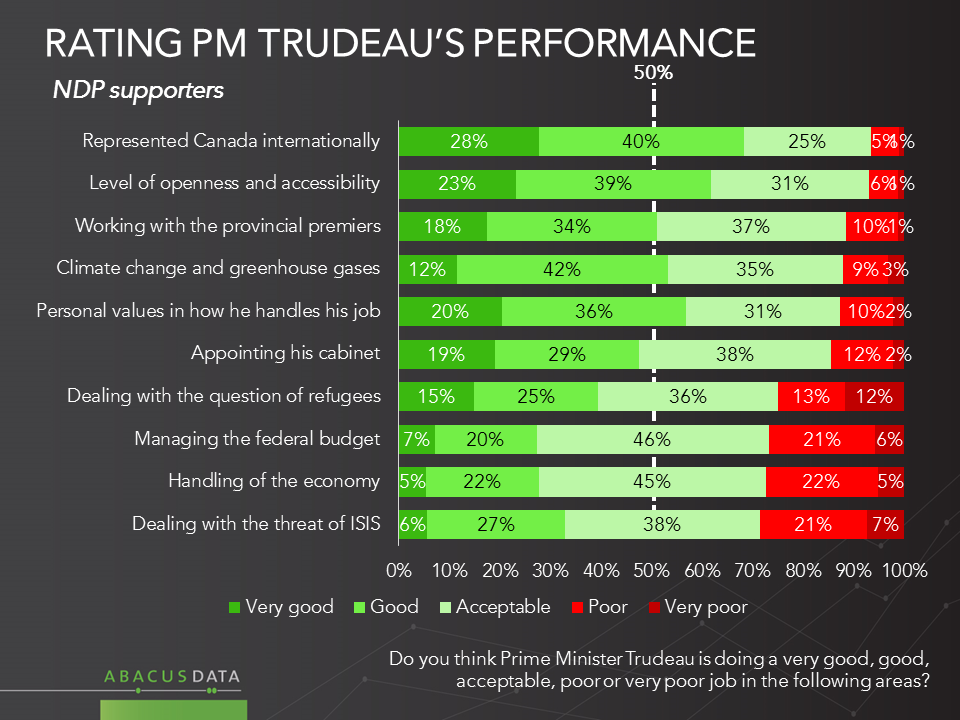Canadians Assess PM Trudeau’s Performance: Detailed Report Card #2
March 21, 2016
A majority of Canadians give Prime Minister Justin Trudeau an acceptable or better performance on 10 out of 10 items measured in our detailed report card. Only a third of those surveyed offer poor assessments on any items, and on 6 of the 10 items the level of “poor job” numbers doesn’t exceed 18%.
The results, in detail, reveal:
• The best results for the PM are for how he represents Canada internationally (86% acceptable or better), his “level of openness and accountability” (88%), and his personal values in how he approaches the job (83%)
• Very large majorities also provide acceptable or better ratings for his approach to working with the provincial premiers, his Cabinet selections, and his approach to climate change and greenhouse gases.
• Weaker ratings, but still 2/3 offering acceptable or better ratings in every case, are for dealing with refugees, ISIS, the economy and the federal budget.

• Since January, there has been only minor changes in the performance ratings of the Prime Minister. The percentage of respondents giving PM Trudeau less than an acceptable rating dropped by more than three 3 points on only three items: working with provincial premiers (89% to 85%), handling the economy (72% to 68%), and managing the federal budget (71% to 67%).


Looking at the breakdowns of responses by region and past vote reveal a number of interesting things.
• When it comes to the PERSONAL VALUES HE BRINGS TO THE JOB, majorities in every region, including Alberta (66%) give the PM acceptable or better marks. In fact in Alberta, more give the PM good ratings (41%) than poor (35%) ratings. Large majorities of NDP, Green and BQ voters give the PM acceptable or better ratings as do 59% of those who voted Conservative in the fall.

• On his approach to REPRESENTING CANADA INTERNATIONALLY, more than 3 out of 4 people in every region give acceptable or better ratings. In Alberta 2 voters give the PM good ratings for every 1 who offers a poor rating. Only 1 in 3 Conservative voters rate the PM poorly on this item.

• On CLIMATE CHANGE, majorities in every region give the PM passing marks or better, including 64% of Albertans, and 62% of Conservative voters.

• On DEALING WITH ISIS, majorities in every region but Alberta give the PM passing grades or better. In Alberta, opinion is split with 48% saying Mr. Trudeau is doing a good or acceptable job and 51% saying poor or very poor. Conservative voters are decidedly less satisfied with the PM on this point, with 72% offering negative assessments.

• On HANDLING THE ECONOMY, majorities in every region give acceptable or better grades to the PM, except in Alberta, where opinion is split, and 53% offer a negative assessment. Partisans of four out of five parties are satisfied, while 70% of Conservative voters are not.

• Similar results are seen on MANAGING THE FEDERAL BUDGET. A majority of Alberta voters 57%) and of Conservative voters (72%) give poor assessments, while majorities in the rest of the country and of other parties’ supporters are satisfied.

• When it comes to his approach to DEALING WITH REFUGEES, a majority of Conservative voters and Albertans give Mr. Trudeau poor ratings while a majority in other regions of the country and voters for other parties give him positive ratings.

To further summarize the trends along partisan lines, here is what we see.
Majorities of CONSERVATIVE voters consider Prime Minister Trudeau to be doing an acceptable job in terms of representing Canada internationally, working with the Premiers, dealing with climate change, being open and accessible and choosing a good cabinet. Conservative voters are mostly unhappy with handing of the economy, ISIS, refugees, and federal budget issues.

Large majorities of NDP voters give the PM acceptable or better marks on all 10 items tested. Weakest results are for ISIS, federal budget, and handling of the economy.

THE UPSHOT
According to Bruce Anderson: “Voters show little evidence of dismay or disappointment with the choices that the new government has made in its first few months in office.
No doubt this level of positive sentiment will be tested in the days ahead with the first budget, and with other challenging decisions. But up this point, it’s fair to say that the Liberal government has met or exceeded the hopes of NDP voters – putting extra pressure on Thomas Mulcair as he faces leadership review within his party.
Among Conservatives, the results portray a lower level of polarization that existed in the run up to the election.
While large majorities of Conservative voters are unhappy with the government on fiscal, ISIS and refugee issues, substantial numbers find it hard to take issue with the approach the Prime Minister has been taking on several other issues, including, remarkably, his handling of the economy and international affairs. These are two issues that had been seen, by Conservatives, as important Conservative brand advantages under Stephen Harper.
Finally, on the issue of climate change, only 4 in 10 Conservative voters say they are unhappy with Mr. Trudeau’s approach to date. That of course may change, based on the hard choices that will come in the months ahead, but so far the PM has managed to approach this issue in a way that has alienated few on the left or on the right, despite some of the often heated rhetoric coming from both ends of the spectrum.”
METHODOLOGY
Our survey was conducted online with 1,500 Canadians aged 18 and over from March 16 to 18, 2016. A random sample of panelists was invited to complete the survey from a large representative panel of over 500,000 Canadians.
The Marketing Research and Intelligence Association policy limits statements about margins of sampling error for most online surveys. The margin of error for a comparable probability-based random sample of the same size is +/- 2.6%, 19 times out of 20. The data were weighted according to census data to ensure that the sample matched Canada’s population according to age, gender, educational attainment, and region. Totals may not add up to 100 due to rounding.
ABACUS DATA
We offer global research capacity with a strong focus on customer service, attention to detail and value added insight. Our team combines the experience of our Chairman Bruce Anderson, one of Canada’s leading research executives for two decades, with the energy, creativity and research expertise of CEO David Coletto, PhD. For more information, visit our website at http://www.abacusdata.ca/




